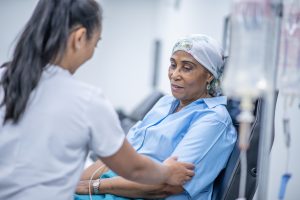Although anyone can be affected by cancer, some demographics are more likely to suffer complications from the disease than others. African Americans, for example, experience higher cancer death rates than any other racial and ethnic group in the United States. Data from the American Cancer Society (ACS) confirms this increased risk for both men and woman diagnosed with breast, prostate, lung or colorectal cancer.
Dr. Seth Howard Berk, an oncology and hematology specialist at Regional Cancer Care Associates (RCCA) in Mount Holly, NJ, says: “In 2012, the death rate for all cancers combined was 24% higher in black men and 14% higher in black women than white men and white women, respectively.” Regarding prostate cancer specifically, Dr. Berk notes, “The risk of prostate cancer in black men is 1 in 6, whereas in Caucasian men, it’s 1 in 8. And the risk of dying of prostate cancer in African-American men is 1 in 23, where the risk of dying in the non-Hispanic Caucasian population is 1 in 42.” Due to rising awareness of these factors, oncologists like Dr. Berk have identified a variety of potential causes for these disparities, as well as strategies to combat them.
Risk Factors For African Americans
The common misconception is that racial disparities among cancer patients are caused by genetic differences. While genetic abnormalities certainly play a role, as Dr. Berk explains, they are not the only contributing factor. Whether a cancer patient survives or not is contingent upon a variety of intersecting factors, including the type, stage and size of the tumor, other interrelated health conditions, medical history, how early the cancer was detected and other details.
The Role Of Socioeconomic Status
Some doctors and researchers believe that African Americans have higher cancer mortality rates because of certain socioeconomic factors. Having a low socioeconomic status (SES) has been linked to a lack of health insurance and limited access to healthcare. According to the ACS, in 2014, 12% of African Americans were uninsured, compared to 8% of the non-Hispanic white population. Without medical coverage, patients may be less likely to go for screenings, and, as a result, don’t receive a diagnosis until the disease has progressed into an advanced stage. With a later diagnosis, treating and overcoming the illness becomes more difficult.
For example, the ACS reports that from 2005-2011, 63% of Caucasian women were diagnosed with breast cancer at an early stage, but only 52% of African American women were.
In addition, the National Cancer Institute suggests that low SES is often associated with a number of environmental and lifestyle factors that could explain why some African Americans are at higher risk of being diagnosed with and dying from cancer. Some of those factors include:
- Low education and literacy levels. Not being able to understand or read medical information can be a barrier to healthcare.
- Obesity. Being overweight is linked to hypertension and diabetes, both of which take a toll on the body over time and can possibly interfere with the cancer treatment process. According to the American Diabetes Association, African Americans are nearly twice as likely to be diagnosed with diabetes as Caucasians are.
- Environmental toxins. Many individuals with low SES reside in low-income housing, which is sometimes located near highways, landfills, factories or other hazardous areas. Living in unhealthy housing and being exposed to air pollution can cause asthma, cancer and other issues.
Dr. Berk explains that because of the complexities of identifying risk factors, much remains unknown about why African Americans have higher cancer rates than other groups. However, the experienced oncologists at RCCA are able to review the impact of genetic variances, socioeconomic disparities and other factors to deliver the highest quality of care to cancer patients.
Cancer Treatment Options
Dr. Berk notes that at RCCA, treatment regimens are designed in response to individual patient needs with consideration of race as a contributing factor, but not a sole determinant. Because of this, all patients have equitable access to potentially life-saving treatments and research initiatives, regardless of race.
Outreach programs for underserved New Jersey communities have also helped improve early detection and subsequent care. Efforts are continuing every day to help narrow the gap and increase the survival rate for African American cancer patients.









